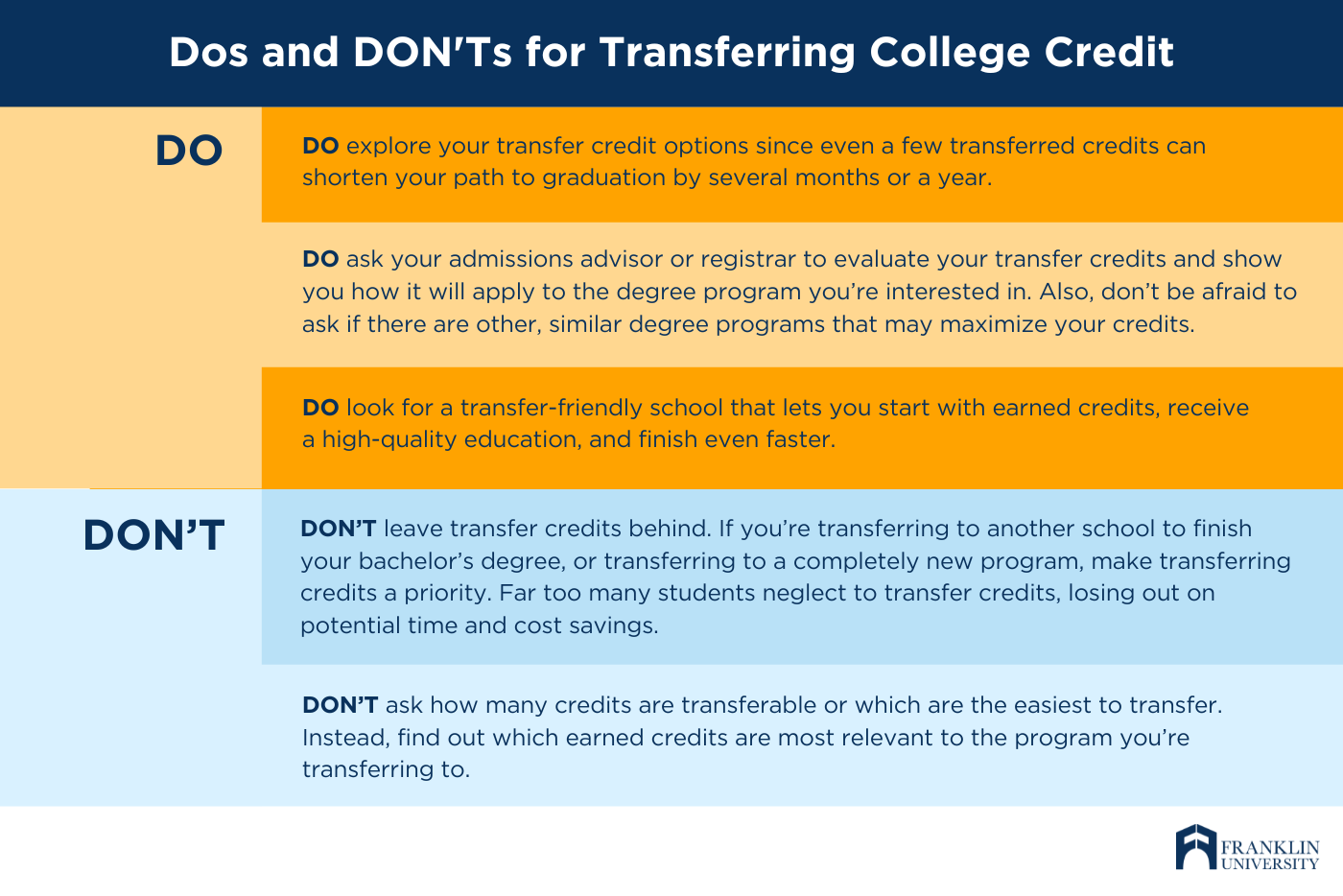Request Information
We're Sorry
There was an unexpected error with the form (your web browser was unable to retrieve some required data from our servers). This kind of error may occur if you have temporarily lost your internet connection. If you're able to verify that your internet connection is stable and the error persists, the Franklin University Help Desk is available to assist you at helpdesk@franklin.edu, 614.947.6682 (local), or 1.866.435.7006 (toll free).
Just a moment while we process your submission.

Will My College Credits Transfer?
Imagine going to college, completing a few (or a lot of) courses only to discover that your credits amount to nothing. Zip. Zero. Zilch.
That would be a terrible waste of time and effort, not to mention money.
Keep reading to learn how to avoid losing your hard-earned college credits and, more importantly, how to get all the transfer credit you’re eligible for.
What Is Transfer Credit?
Transfer credit refers to any college courses you’ve successfully completed at a community college, technical college or accredited four-year college. Transferring college credit is a great way to keep the credit you’ve already earned when you change schools.
More formally, transfer credit is defined by the American Council on Education (ACE) as:
“Transfer credit refers to the credit a college or university grants for prior learning. When you move from one college or university to another, the credit from the courses and degrees you took at the old institutions might or might not be accepted by your new institution. Each educational institution makes its own decisions about accepting transfer credit.”
In short, transfer credit lets you apply previously earned credit hours or prior learning at one institution toward a degree at a different institution.
What Counts as Transfer Credit?
Transfer credit can include a lot of things including, of course, coursework from undergraduate degree programs.
But college coursework isn’t the only thing that counts. Transfer credit also may include a wide variety of experiences, classes and training.
.png)
1. Professional Training and Licenses
Have you ever thought that colleges should give credit for licenses and certifications earned, or for specialized skills? Good news. Some colleges and universities do give college credit for prior certification, training and experience.
Credit for prior learning acknowledges your life experience and deserves to be counted, saving you time and money on your degree.
Whether you’ve earned a Google certificate, gone through paramedic training, achieved CompTIA certification, completed professional development courses through the American Institute of Banking (AIB), or earned another job-specific credential, it pays to find out if your college or university will recognize your achievements and award transfer credit.
Some colleges and universities like Franklin University, have an online database of hundreds of job-specific experiences for which they award credit so you can get a general idea of how much transfer credit you might have
Talk with your admissions advisor to be sure, because each school determines the number of eligible transfer credits under the guidance of the The ACE National Guide or the National College Credit Recommendation Services (NCCRS).
Accelerate your completion time and lower your total tuition cost at every academic level. Download this free guide for tips on maximizing your transfer credit.
2. Advanced Placement Classes
Did you take AP classes in high school or AP tests on The College Board? If you did and you scored a 3, 4 or 5, you may be eligible to transfer this credit toward your degree program.
3. StraighterLine Courses
Straighterline, an online learning platform that partners with 150+ institutionally accredited colleges and universities, offers GenEd courses that may be eligible for transfer credit. All StraighterLine courses are recommended for credit by ACE.
4. Proficiency Exams
CLEP Tests and DSST Exams enable you to “test out” of college courses by taking an exam to demonstrate your knowledge of a subject. Only passing/appropriate grades may be eligible for transfer.
5. Military Training
As a military service member, veteran, or member of the Reserves, you may be eligible to receive college credit for Military Occupational Specialty (MOS) training, Army Advanced Individual Training (AIT), military jobs, or other completed courses.
6. Life Experience
If you have extensive work experience and are able to demonstrate that you possess knowledge specific to a particular class, you may be eligible for transfer credit. A portfolio is just one example of how you can demonstrate your knowledge and experience.
Frequently Asked Questions About Transfer Credit
How Many Credits Can I Transfer?
It’s important to know the number of credits you’re eligible to transfer because how many credits you have versus how many will actually transfer may be two entirely different things.
The number of college credits that are eligible for transfer is, ultimately, what impacts how long it will take you to finish your degree and, by extension, how much money you’ll spend on your degree.
But, knowing how many college credits you can transfer isn’t as simple as a 1+2=3 formula. It really depends on your school, your credits and the program you’re enrolling in.
Even the Higher Learning Commission (HLC), which is an institutional accreditor for degree-granting, post-secondary educational institutions in the United States, doesn’t define exactly how many credits are transferable.
Instead, schools set their own policies regarding transfer credit, including the number of credits that must be earned (also known as a residency requirement). For example, Franklin University has a 30-hour residency requirement for undergraduates, meaning that students seeking a bachelor’s degree must complete at least 30 credit hours at the university to earn the degree.
Hint: The most transfer-friendly schools have the lowest residency requirements.
Do Community College Credits Expire?
In theory, the answer is no. Community college credits do not expire, however, the opportunity to transfer them may diminish over time.
In general, most standard core classes transfer easily from community college toward a bachelor’s degree. STEM (Science, Technology, Engineering and Math) courses, however, typically have a 10-year shelf-life whereas graduate courses usually are only transferable for about seven years.
Is It Hard to Transfer College Credits?
Not really. Again, it depends on the school and your degree program. Many institutionally accredited colleges and universities have articulation agreements with other schools, particularly community colleges.
An articulation agreement is the same as a transfer agreement and is just another way of saying that the schools have pre-evaluated certain courses to ensure that they’re a good match for their programs. For the most part, if you’ve accrued substantial credits, say, for an associate degree, you can anticipate that at least a portion of them will likely transfer to your undergraduate degree program.
Keep in mind that transfer credit is more common for undergraduate programs than for graduate programs. Franklin University, for example, allows students to transfer up to 94 previously earned credits toward a bachelor’s degree and up to 12 hours for master’s. You can read more about master’s and graduate transfer credit here.
How Are Credits Evaluated for Transfer?
“We look at course descriptions to see how well they match to learning outcomes,” says Laura Coulter, senior transfer and articulation evaluator at Franklin University. “Typically we say that the course outcomes have to match 70% to our learning outcomes. At the undergraduate level it’s a little easier to make those matches. For example, marketing principles from one school typically match marketing principles to another. The higher the level, the more difficult it becomes to transfer credit because the learning outcomes are different.”
With that in mind, you can expect your previously earned credit to be evaluated on criteria such as:
- Where you earned the credits. Are you transferring credits from a non-accredited or an institutionally accredited school? Courses from institutionally accredited programs are more likely to transfer compared to those from non-accredited schools.
- How well you did in your classes. Admissions or the registrar will often review your transcripts to see how well you did in your classes. Most will transfer the credit if you earned a grade of B or higher, though many reputable programs also give transfer credit for having a passing grade.
- Where you are transferring credits to. Transfer credit policies vary widely, so it’s best to ask your school’s admissions advisor or registrar’s office what their particular policy is. In general, you can expect to transfer between 12 and 94 credit hours.
Is There Anything I Can Do to Make Transferring Credits Easier?
Transferring credit isn’t as hard as you might think. In fact, some institutions have their own proprietary transfer credit tool that helps you forecast how many transfer credits you might have. This makes it far easier to understand how many community college, technical college, or other earned credits you may be able to transfer.
For example, Franklin University’s myTransfer Credit is a free online tool that lets students see how many credits might transfer to an undergraduate degree at the school. Users can even create an account so they can save their information for later. Plus, the tool lets users identify and compare degree programs, enabling them to make the most of their transfer credits. And, that, as you know, can mean earning a degree faster and more affordable.
DOs and DON’Ts for Transferring College Credit

Ready to Transfer College Credits?
Technical and community colleges are great because you can complete courses, earn credit and save money on your college degree. Work and life experiences are great, too–especially if you can get college credit for what you’ve already learned.
No matter where you’ve earned your knowledge and skills, it’s a good idea to see if you’re eligible for transfer credits. That way you can turn an associate degree into a bachelor’s degree more quickly or finish your undergraduate degree faster.
Whether you’ve taken one class at a two- or four-year college, you’ve completed enough classes to earn an associate degree, or somewhere in between, your hard work deserves to pay off. Use the information and tips found here to get all the credit you deserve as you go back to college.





